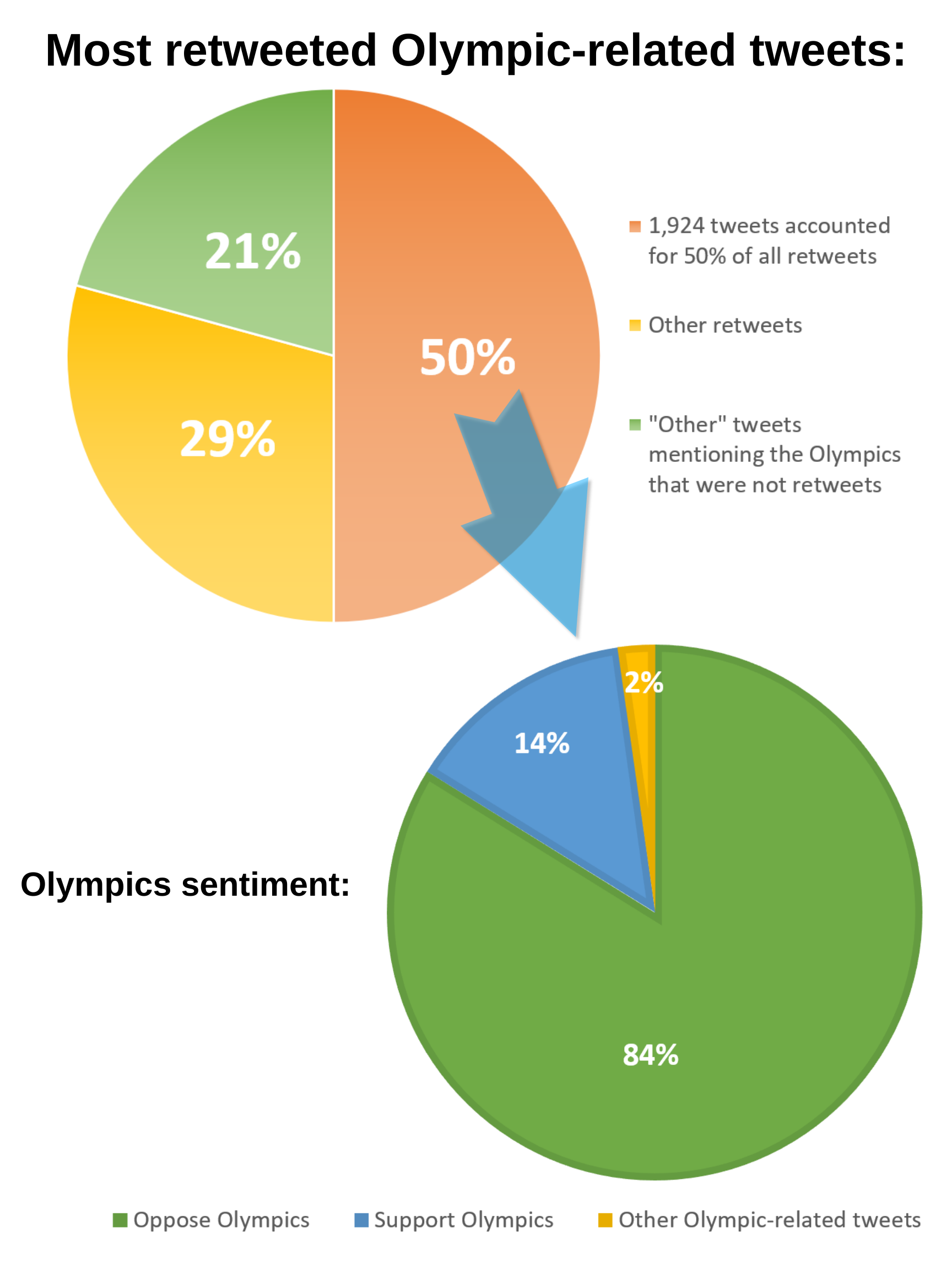Despite the best efforts of the Japanese government and other supporters to boost excitement for this summer’s Tokyo Olympics, most Japanese people wanted to cancel the Games, according to public opinion polls and a torrent of comments on social media.
Rising infections in Japan with no end in sight have influenced public opinion against holding the Olympic Games. By late May 2021, more than 700,000 people in Japan had tested positive for COVID-19, with significant outbreaks in the Tokyo and Osaka regions during a “fourth wave” of rising infections this spring.
In a poll conducted by the newspaper Asahi Shimbun in April 2021, when a rising wave of infections triggered a state of emergency in Japan, 69 percent of respondents indicated they wanted to either cancel or once again postpone the Tokyo Olympics, which commence on July 24.
A month later, in May, a different poll conducted by the Mainichi Shimbun newspaper indicated that 63 percent of respondents wanted to cancel or postpone the Olympics. A TV Asahi poll conducted at the same time indicated that 80 percent of Japanese people want to postpone or cancel the Olympics.
As Japanese politicians have vowed to press on with the Games, the public has perceived little progress being made with vaccinations. There have also been recent reports that scarce supplies of vaccines have been diverted from the elderly to Olympic athletes, while a senior medical advisor has expressed serious concernsabout holding the Games as planned.
Discussion about whether or not to hold the Olympic Games this summer has raged on social media as well. Using Twitter’s public API, Global Voices analyzed more than 2.5 million Japanese-language tweets that included the terms “オリンピック” or “五輪” (common Japanese terms for the Olympics) between May 9 and May 16, 2021. We wanted to find out what ordinary Japanese thought about plans to continue with hosting the Olympics.
We observed that Twitter opinions reflected the sentiment revealed in public opinion polls, but the social media comments revealed more nuances than could be reported from public opinion research.
Of the more than 2.5 million tweets between May 9 and May 16 containing the words “オリンピック” or “五輪”, about 79.25 percent were retweets. This high number of retweets indicates Twitter users were familiar with, and highly interested in, the Olympic conversation.
We also discovered that just 1,924 of the most retweeted tweets accounted for 50 percent of all tweets covering the Olympics. So, we decided to focus on this relatively small number of popular tweets.
We categorized the 1,924 most retweeted tweets into tweets that supported hosting the Olympics, tweets that opposed hosting the Olympics, and “other tweets.” Eighty-four percent of tweets opposed the Olympics, and were retweeted more than 1 million times in total.
Using Twitter’s public API, Global Voices analyzed more than 2.5 million Japanese-language tweets, and then examined the 1,924 most-retweeted tweets, which accounted for more than 50 percent of the tweets in our dataset. We categorized these retweeted tweets into tweets that supported hosting the Olympics, tweets that opposed hosting the Olympics, and “other tweets.” Eighty-four percent of tweets opposed the Olympics, and were retweeted more than 1 million times in total.
In our dataset, there were only 15 highly popular tweets in support of the Olympics. These 15 tweets were retweeted 6,529 times, and focused mostly on the positive aspects of the Games, including discussions about popular Olympic athletes.
Still, the volume of tweets in support of the Olympics represented less than 1 percent of our dataset. Very few people were talking about the bright side of Olympics on Twitter, indicating negative attitudes in Japan towards the Games.
As well, based on data provide by Twitter’s API, people from a variety of occupational backgrounds tweeted about the Olympics. People working in cultural industries tweeted the most:
Global Voices analyzed more than 2.5 million Japanese-language tweets, and then examined the 1,924 most-retweeted tweets, which accounted for more than 50 percent of the tweets in our dataset. People from a variety of occupational backgrounds tweeted about the Olympics.
Another insight from our dataset was that the most retweeted tweets linked the Olympics with COVID-19 and related topics. Among the related topics, many tweets in opposition to the Olympics include criticism of the Japanese government’s response to the pandemic.
An example of this is the most retweeted tweet in our dataset, which had been retweeted more than 18,000 times during the research period, and more than 36,000 times as of early June.
What we want to see happening again are school sports meets and school fairs being held again. We want to go with friends to Disneyland again, or to amusement parks, go to concerts and events, and just do things that make lives enjoyable. [Over the past year and more of the pandemic] we’ve put up with so much to somehow do all these things again, not to sacrifice ourselves for the Olympics.
The tweet references the fact that, due to various lockdowns and states of emergency, many events and activities have been canceled to prevent the spread of COVID-19. At the same, the Japanese government appeared to encourage Olympics-related public gatherings with plans to bus in 800,000 students and tens of thousands of other spectators for the Olympics.
Other popular tweets opposing the Olympics in our dataset point out the sheer burden of hosting the event compared to the everyday life people long to return to once the pandemic is over.
[Economist, Japanese cabinet advisor, and professional pundit] Takahashi Yoichi pouts and says, “If you cancel the Olympic Games, then you may as well cancel every other sport.” Yet, private sporting events do not require 10,000 medical workers and 500 nurses and 200 sports doctors to cooperate for free. They do not waste a trillion yen of blood money in the first place.
While anger and other sentiments towards the Games can be difficult to quantify, other popular tweets demonstrate the consequences of public opposition to the Games. For example, this tweet, about news about shortage of volunteer staff for Olympic, was retweeted 4,802 times between May 9 and May 16.
About 70 percent of the nurses who had been anticipated would work as medical volunteers [
atduring the Olympics] at the Ibaraki Prefectural Kashima Soccer Stadium, the practice venue of the Tokyo Olympics soccer competition venue, have declined to so. It has become clear that it is becoming difficult to secure medical staff for the Olympics.Article title: 70 percent of volunteers decline to participate in Olympics
Finally, there is a serious divide on Twitter between those who support and those who oppose the Games. For example, some of the most retweeted tweets are not from credible news sources, and make claims without a basis in facts or expertise.
For example, the most retweeted tweet in support of the Games during our research period, was by Takahashi Yoichi, a pundit who advises the Japanese government on economic policy, and has no particular expertise in COVID-19, infectious diseases, or public health.
[Compared to other countries] the pandemic in Japan is just a ripple. You want to cancel the Olympics over *this*? LOL LOL
Based on a sample of 2.5 million tweets, in May 2021 the Japanese public was generally opposed to holding the Tokyo Olympics this summer, if at all. This opposition to the Games is likely based on poor public perception of how the government has handled the COVID-19 pandemic, as well as plans for public events that contradict lockdown rules aimed at halting the spread of infections.
It was hard to find positive tweets in support of the Games. Instead, most of the popular supportive tweets typically attacked opponents of the Games, or were from sources of dubious credibility. Even those who support the Olympics the most seem to have little positive to say.































